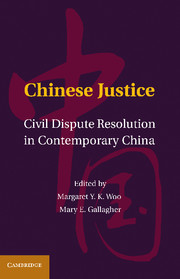Book contents
- Frontmatter
- Contents
- Tables and Figures
- Contributors
- Acknowledgments
- Abbreviations
- Glossary
- Introduction
- PART I LEGAL DEVELOPMENT AND INSTITUTIONAL TENSIONS
- PART II PU FA AND THE DISSEMINATION OF LAW IN THE CHINESE CONTEXT
- 5 The Impact of Nationalist and Maoist Legacies on Popular Trust in Legal Institutions
- 6 Public Attitudes toward Official Justice in Beijing and Rural China
- 7 Users and Non-Users: Legal Experience and Its Effect on Legal Consciousness
- 8 With or without the Law: The Changing Meaning of Ordinary Legal Work in China, 1979–2003
- PART III LAW FROM THE BOTTOM UP
- Conclusion: Chinese Justice from the Bottom Up
- Index
- References
7 - Users and Non-Users: Legal Experience and Its Effect on Legal Consciousness
Published online by Cambridge University Press: 05 July 2011
- Frontmatter
- Contents
- Tables and Figures
- Contributors
- Acknowledgments
- Abbreviations
- Glossary
- Introduction
- PART I LEGAL DEVELOPMENT AND INSTITUTIONAL TENSIONS
- PART II PU FA AND THE DISSEMINATION OF LAW IN THE CHINESE CONTEXT
- 5 The Impact of Nationalist and Maoist Legacies on Popular Trust in Legal Institutions
- 6 Public Attitudes toward Official Justice in Beijing and Rural China
- 7 Users and Non-Users: Legal Experience and Its Effect on Legal Consciousness
- 8 With or without the Law: The Changing Meaning of Ordinary Legal Work in China, 1979–2003
- PART III LAW FROM THE BOTTOM UP
- Conclusion: Chinese Justice from the Bottom Up
- Index
- References
Summary
A major question in the law and society literature is the effect of legal experience on individual attitudes toward legal institutions, in particular the court system. Positive attitudes and confidence in the legal system are important for generating citizen trust and confidence in government generally and also for inculcating citizen values and behavior that support the rule of law and encourage legal (and peaceful) resolution of disputes and grievances more specifically. Thus, these values are important for sustaining democracy. For a country like China, in transition from state socialism, in which legal modes of governance and social control were less common than administrative edicts, Communist Party campaigns, and state repression, attempts to build an effective legal system are also linked to limited political reform. Rule of law building is the Chinese Communist Party's (CCP) attempt to build more effective and efficient governance, while making an end run around democratization and the sharing of political power. In this case, creating positive citizen attitudes toward the legal system is part of a strategy to avoid democracy.
In this chapter, we examine how experience with the legal system affects Chinese citizens' evaluation of the courts through a series of comparisons between those who have used the law to resolve an employment dispute and those who have not as well as comparisons between disputants who remained positive and confident in the legal system and disputants who were fully disillusioned and negative.
- Type
- Chapter
- Information
- Chinese JusticeCivil Dispute Resolution in Contemporary China, pp. 204 - 233Publisher: Cambridge University PressPrint publication year: 2011
References
- 21
- Cited by

